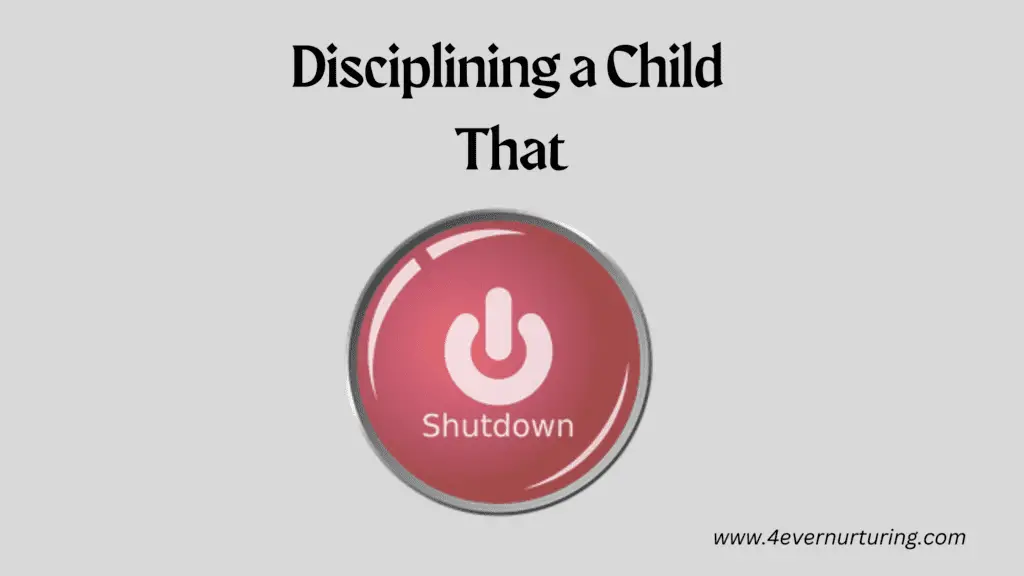Parents are responsible for the actions and behaviors of their children hence they have to discipline them when necessary. When it comes to disciplining a child, the headache comes to disciplining a child that shuts down. When such a situation occurs, a parent might feel helpless and frustrated at the same time. This is mainly because there are no clear ways on how to discipline a child that shuts down.
So what is the answer to how to discipline a child that shuts down? As a parent, you should start by acknowledging that your child is shutting down or might shut down. In many cases, parents are aware of a child’s behaviors based on past occurrences.
The next step would be to explain to the child that you understand their feelings and that you are there to help. This should be done indirectly whereby you let them know that you are concerned about overhearing you talk about it to someone else. You can also utilize other tips on talking to a child that shouts down.
Get to know what is making them upset and listen carefully and be willing to offer reassurance when and where needed. During this whole period, criticism, arguing, and punishment should be avoided at all costs. Let the child express his or her feelings in their own way and be patient and respectful of their needs.
What Does Shutting Down Mean
Generally, when a child or a person “shuts down,” it means that they are withdrawing emotionally or physically from a situation. They may become unresponsive, uncommunicative, or disengaged. This is often a coping mechanism for dealing with overwhelming emotions, stress, or difficult situations.
Shutting down can manifest in different ways, for example, a child may stop talking, become quiet, and avoid eye contact, or a person may withdraw from social interactions, and become apathetic or unresponsive.

Causes of Shut Down
Shutting down in children can be a sign of underlying emotional or psychological issues such as trauma, anxiety, depression, or attachment disorders, and it can also be a symptom of autism or other neurodevelopmental disorders. In some cases, shutting down can be temporary, while in others it can be a long-term pattern of behavior.
Below are some of the common reasons behind shutdown in children:
Trauma: Children who have experienced traumatic events, such as abuse or neglect, may shut down as a coping mechanism to protect themselves emotionally.
Anxiety: Children who have anxiety disorders may shut down as a way to avoid triggers or situations that cause them distress.
Stress: Children may shut down as a result of chronic stress in their environment, such as poverty, family conflict, or a high-pressure school environment.
Related: What to Know About Fostering a Troubled Teenager
Lack of attachment: Children who have not formed a secure attachment with a primary caregiver may shut down as a way to protect themselves from further attachment injuries.
Communication difficulties: Children who have difficulty communicating may shut down as a way to avoid frustration or confusion.
Sensory overload: Children who are sensitive to certain stimuli, such as bright lights or loud noises, may shut down as a way to protect themselves from overwhelming sensory input.
Autism: Children with autism may shut down as a way to cope with overwhelming social situations or sensory input.

It is crucial to note that the reasons for shutting down can vary from child to child and can be caused by a combination of factors. It’s also important to understand the specific needs and triggers of each child.
How to Discipline a Child That Shuts Down
Shutting down is not necessarily a bad thing as it can be a way for a child to cope with difficult emotions and situations. However, if it becomes a persistent and negative pattern that affects a child’s development, it’s crucial to seek professional help to understand the underlying causes of the behavior and develop a treatment plan to address it.
Disciplining a child who “shuts down” can be a challenging task for parents, guardians, or caregivers. When a child shuts down, he or she may become withdrawn, unresponsive, or uncommunicative. This can make it difficult for parents and caregivers to understand what is causing the behavior and how to address it. However, with patience, understanding, and a consistent approach, it is possible to discipline a child who shuts down.
Related: What Are Foster Parents Not Allowed To Do
Key Steps on How to Discipline a Child That Shuts Down
First, it is important to understand that a child who shuts down may be experiencing a range of emotions, including fear, anxiety, and/or trauma. It is essential to approach the child with empathy and understanding, rather than anger or frustration. Parents and caregivers should take the time to listen to the child and try to understand what is causing their behavior.
After identifying the underlying cause of the child’s behavior, steps to address it are then taken. For example, if the child is shutting down due to fear or anxiety, you as the parent may need to provide additional support and reassurance. This can be done through simple gestures such as holding the child’s hand, giving them a hug, or offering words of encouragement.
It is also important to set clear boundaries and expectations for the child’s behavior. Parents as well as caregivers should be consistent in their approach and enforce consequences for inappropriate behavior. For example, if the child is shutting down in response to a specific task or situation, as a parent you should work with the child to establish a clear plan for how to handle that task or situation in the future.

Another key aspect of disciplining a child who shuts down is to focus on positive reinforcement. This calls for you as the parent or caregiver to praise and encourage the child when he or she exhibits appropriate behavior. This can help to build the child’s self-esteem and self-confidence, which can in turn reduce their tendency to shut down.
Another effective tool in disciplining a child who tends to shut down is to provide him or her with a sense of control. Children who feel like they have no control over their environment or circumstances may be more likely to shut down. Children can be provided with a sense of control by allowing them to make choices and decisions. For example, asking a child to choose between two different activities or giving them the option to decide when to start a task.
Should Professionals be Involved?
At some point, it might be necessary to work with professionals such as a child therapist or a pediatrician. Professional help should be sought if the child’s shutting down behavior is persistent and affects the child’s development. Child therapists can help to identify the underlying causes of the child’s behavior and develop a treatment plan to address it.
Final Thoughts
Disciplining a child who shuts down requires patience, understanding, and a consistent approach. When it comes to disciplining a child that shuts downs, ensures that you understand the root cause of the child’s behavior. Also, patience is necessary as children require time to process emotions and respond to discipline. Ensure that your expectations are clear and consistent and that you use a calm and firm tone while addressing the child’s behavior.
Keep in mind that disciplining is not all about punishment but also about teaching a child how to make better future decisions.







